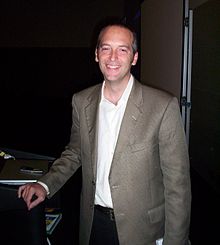John F. Hartwig
John F. Hartwig | |
|---|---|
 Hartwig at the 2007 Boston ACS meeting | |
| Born | John F. Hartwig 1964 Elmhurst, Illinois |
| Nationality | American |
| Alma mater | University of California, Berkeley Ph.D (1990) Princeton University A.B. (1986) |
| Known for | Organometallic chemistry, Inorganic chemistry, Catalysis |
| Awards | Willard Gibbs Award (2015) Wolf Prize in Chemistry (2019) Arthur C. Cope Award (2021) |
| Scientific career | |
| Fields | Chemistry |
| Institutions | University of California, Berkeley |
| Doctoral advisors | Robert G. Bergman and Richard A. Andersen |
| Website | hartwig |
John F. Hartwig is an American organometallic chemist who holds the position of Henry Rapoport Professor of Chemistry at the University of California, Berkeley. His laboratory traditionally focuses on developing transition metal-catalyzed reactions. Hartwig is known for helping develop the Buchwald–Hartwig amination, a chemical reaction used in organic chemistry for the synthesis of carbon–nitrogen bonds via the palladium-catalyzed cross-coupling of amines with aryl halides.
Education and training
Hartwig received his A.B. from Princeton University in 1986. With Robert G. Bergman and Richard A. Andersen as coadvisors, he earned his Ph.D. from the University of California, Berkeley in 1990. Thereafter he was an American Cancer Society Postdoctoral Associate at MIT, where he worked in the laboratory of Stephen J. Lippard.
Research
He assumed an independent position at Yale University in 1992. Over the next 14 years, he was promoted to associate professor, full professor and finally the Irénée duPont professorship. During this period, the Buchwald–Hartwig amination was developed. Here is an example of this reaction (OTf = triflate or trifluoromethanesulfonate):

Also while at Yale, he discovered the metal-catalyzed borylation of unactivated C-H bonds.[1][2]

In 2006, he assumed the Kenneth L. Reinhart Jr. professorship at the University of Illinois at Urbana–Champaign. There he published "Organotransition Metal Chemistry: From Bonding to Catalysis."[3] In 2011 he returned to Berkeley as Henry Rapoport Professor of Chemistry as well as a member of the Lawrence Berkeley National Laboratory. He was elected to the National Academy of Sciences in 2012. In 2019, together with Stephen Buchwald, he was awarded the Wolf Prize.
Memberships, fellowships, and awards
| 2022 | Emanuel Merck Lectureship[4] |
| 2021 | Arthur C. Cope Award |
| 2020 | Clarivate Citation Laureate |
| 2019 | Wolf Prize in Chemistry[5] |
| 2015 | Member, American Academy of Arts and Sciences[6] |
| 2015 | Willard Gibbs Award[7] |
| 2014 | Janssen Pharmaceutical Prize |
| 2013 | Herbert C. Brown Award for Creative Research in Synthetic Methods[9] |
| 2012 | Member, National Academy of Sciences |
| 2010 | GlaxoSmithKline Scholars Award |
| 2009 | Edward Mack Jr. Memorial Award, Ohio State University |
| 2009 | Mitsui Chemicals Catalysis Science Award, Japan[10] |
| 2009 | Joseph Chatt Award of the Royal Society of Chemistry[11] |
| 2008 | International Catalysis Award from the International Association of Catalysis Society[12] |
| 2008 | Mukaiyama Award from the Society of Synthetic Organic Chemistry, Japan[13] |
| 2008 | Paul N. Rylander Award of the Organic Reactions Catalysis Society |
| 2007 | Raymond and Beverly Sackler Prize in the Physical Sciences |
| 2007 | Tetrahedron Young Investigator Award in Organic Synthesis[14] |
| 2006 | ACS Award in Organometallic Chemistry[9] |
| 2005 | Fellow of the American Association for the Advancement of Science |
| 2004 | Thieme-IUPAC Prize in Synthetic Organic Chemistry[15] |
| 2003 | Leo Hendrik Baekeland Award[16] |
| 1998 | Arthur C. Cope Scholar Award[17] |
| 1997 | Camille Dreyfus Teacher-Scholar Award[18] |
| 1992 | Dreyfus Foundation New Faculty Award |
References
- ^ Chen, H.; Schlecht, S.; Semple, T. C.; Hartwig, J. F. (2000). "Thermal, Catalytic, Regiospecific Functionalization of Alkanes". Science. 287 (5460): 1995–1997. Bibcode:2000Sci...287.1995C. doi:10.1126/science.287.5460.1995. PMID 10720320.
- ^ Hartwig, John F. (November 10, 2011). "Borylation and Silylation of C–H Bonds: A Platform for Diverse C–H Bond Functionalizations". Accounts of Chemical Research. 45 (6). American Chemical Society (ACS): 864–873. doi:10.1021/ar200206a. ISSN 0001-4842. PMID 22075137.
- ^ Hartwig, John (2010). Organotransition Metal Chemistry: From Bonding to Catalysis. New York: University Science Books. p. 1160. ISBN 978-1-938787-15-7.
- ^ "Emanuel Merck Lectureship 2022 awarded to John F. Hartwig". Chemie – TU Darmstadt (in German). June 2, 2022. Retrieved October 15, 2022.
- ^ "Wolf Prize laureates announced". The Jerusalem Post | JPost.com. January 16, 2019.
- ^ "American Academy of Arts and Sciences – 2015 Class list" (PDF).
- ^ "Willard Gibbs Award". chicagoacs.org.
- ^ "Nagoya Medals of Organic Chemistry 2014". October 27, 2014.
- ^ a b "National Awards". American Chemical Society.
- ^ "Mitsui Chemicals Catalysis Science Awards". Mitsui Chemicals, Inc.
- ^ "Search RSC prizes". Royal Society of Chemistry.
- ^ "不動産価格・不動産売買の相場". www.iacs-icc.org.
- ^ "Society of Synthetic Organic Chemistry, Japan – "What's the Mukaiyama Award?". Archived from the original on March 4, 2016. Retrieved May 15, 2015.
- ^ "Tetrahedron Young Investigator Award". www.elsevier.com. Archived from the original on April 19, 2015.
- ^ "Previous Winners – Thieme Chemistry – Georg Thieme Verlag". Thieme.
- ^ American Chemical Society – North Jersey Section (Awards)
- ^ "National Awards". American Chemical Society. Archived from the original on June 9, 2015.
- ^ "Dreyfus Foundation | Dedicated to the advancement of the chemical sciences". Dreyfus Foundation.
